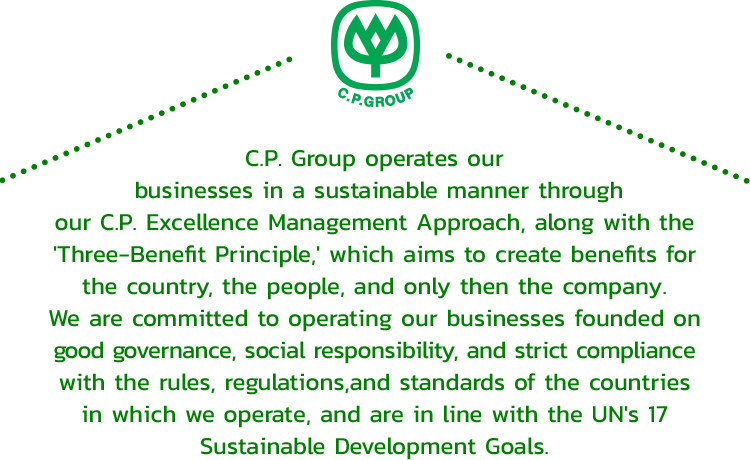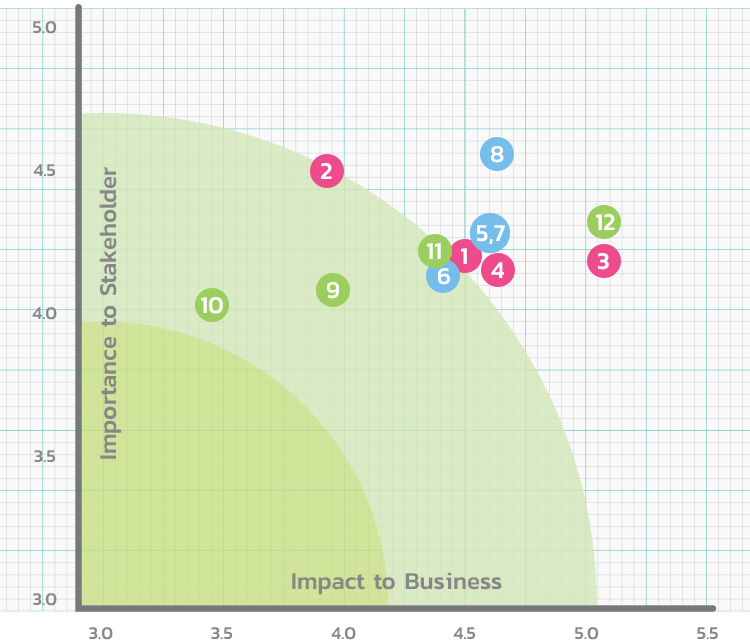Furthermore, the International Trading Business Group C.P. Group is committed to operating our businesses in a sustainable manner beyond compliance of rules and regulations, and standards of the countries in which we operate. This is achieved by complying with international sustainability guidelines, such as The UN Global Compact, UN Guiding Principles on Business and Human Rights (UNGP), and UN Sustainable Development Goals (SDGs).
Framework 2016-2020

Economy Philosophy
Management Approach
17 UN SDGs & UNGP
and Standards

-
CORPORATE GOVERNANCE
-
HUMAN RIGHTS &
LABOR PRACTICES -
EDUCATION &
INEQUALITY REDUCTION -
LEADERSHIP &
HUMAN CAPITAL DEVELOPMENT

-
HEALTH & WELL-BEING
-
SOCIAL IMPACT
-
SOCIAL IMPACT
-
STAKEHOLDER
ENGAGEMENT

-
CLIMATE CHANGE
MANAGEMENT -
WATER STEWARDSHIP
-
ECOSYSTEM &
BIODIVERSITY PROTECTION -
RESPONSIBLE SUPPLY
CHAIN MANAGEMENT
In 2016, C.P. Group and C.P. Intertrade Co., Ltd., the International Trading Business Group developed the Sustainability Strategy and the 2020 Goals under the 3Hs Framework, which includes HEART – Commitment to Sustainable Business, HEALTH – Commitment to Sustainable Society, and HOME – Commitment to Sustainable Environment. The Sustainability Strategy is based on the 4 elements which are reflected from the “Three-Benefit Principle,” the core of our businesses and our sustainability foundation. The Principle aims to create benefits toward the country, the people, and the company. The first element is Sufficiency Economy which can be integrated into our whole supply chain. It emphasizes that businesses must acknowledge and understand their own competency, and operate adequately and sufficiently. The second element is the C.P. Excellence Management Approach which aims at transitioning the organization through internal synergy between business, people, and mind. The third element refers to international guidelines related to sustainable business operations, including UN Global Compact,UN Guiding Principles on Business and Human Rights (UNGP), and UN Sustainable Development Goals (SDGs). C.P Group is committed to operating in accordance with such international guidelines, and supporting all of the 17 SDGs. The last element is rules and regulations, and standards of the countries in which we operate. Strict compliance with such rules and regulations, and standards are fundamental to our businesses.
More importantly, the Group focuses on operating our businesses based on good governance, transparency, accountability, and social and environmental responsibility, which is demonstrated throughout our operations. The goal is for long-term sustainability, and the highest benefits for all stakeholders.
Framework 2021-2030

Economy Philosophy
Management Approach
17 UN SDGs & UNGP
and Standards

-
CORPORATE GOVERNANCE
-
HUMAN RIGHTS &
LABOR PRACTICES -
EDUCATION &
INEQUALITY REDUCTION -
LEADERSHIP &
HUMAN CAPITAL DEVELOPMENT -
CYBER SECURITY &
DATA PROTECTION*

-
HEALTH & WELL-BEING
-
SOCIAL IMPACT
-
SOCIAL IMPACT
-
STAKEHOLDER
ENGAGEMENT -
OCCUPATIONAL HEALTH & SAFETY*

-
CLIMATE CHANGE
MANAGEMENT -
CIRCULAR ECONOMY*
-
WATER STEWARDSHIP
-
ECOSYSTEM &
BIODIVERSITY PROTECTION -
RESPONSIBLE SUPPLY
CHAIN MANAGEMENT

Identify sustainability issues that are relevant to our business by taking into consideration the scope expansion of this Report to our global operations across different industries relevant to ours. The Identification process went through different stages as shown below.
- Reviewing C.P. Intertrade Co., Ltd., the International Trading Business Group and C.P. Group’s 2016 and 2017 key material issues
- Benchmarking material issues with peers that are involved in the same industries with the Group’s 7 Business Lines
- Analyzing global sustainability standards including: The United Nations Global Compact (UN Global Compact) – Advanced level; UN Sustainable Development Goals (SDGs)
- Identifying our material sustainability issues from the previous stages, our business direction, and internal discussion within the Sustainability Committee and Governance Risk and Compliance (GRC) Committee. Prioritized our material issues that were identified

Prioritized our material issues that were identified in Step 1 by our internal and external stakeholders. The Prioritization process went through different stages as shown below.
- Conducting the online Materiality Prioritization Survey to seek opinions and views from executives across all Operation, Business Groups and representatives from various stakeholder groups
- Consolidating the results of materiality assessment in 2018 from our subsidiaries and integrating them into the result of the online Survey; 2.3 Assigning weighting of our Business lines and Our Company in accordance with their revenue
- Calculating scores of the material issues prioritized according to importance to business & stakeholders
- Formulating Materiality Matrix

Validated sustainability reporting process in line with the GRI Standards, and its4 principles. The Validation process went through different stages as shown below. Interviewing external stakeholders with regard to material issues of the Group, feedback and opinion to improve our sustainability reporting process; Considering and approving the prioritized materiality issues by executives Verifying and assuring the accuracy and completeness of our sustainability reporting process by an independent third party.
Improvement

C.P. Intertrade Co., Ltd., the International Trading Business Group C.P. Group is open to feedback and suggestions from all, to continuously improve our future Sustainability Reports to meet the expectations of all stakeholders, through various communication channels


- 1 Corporate Governance
- 2 Human Rights and Labor Practices
- 3 Leadership &
Human Capital Development - 4 Education

- 5 Social Impact
- 6 Health & Well-Being
- 7 Stakeholder Engagement
- 8 Innovation

- 9 Climate Change Management
- 10 Water Stewardship
- 11 Ecosystem & Biodiversity
Protection - 12 Responsible Supply Chain Management




